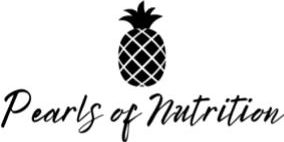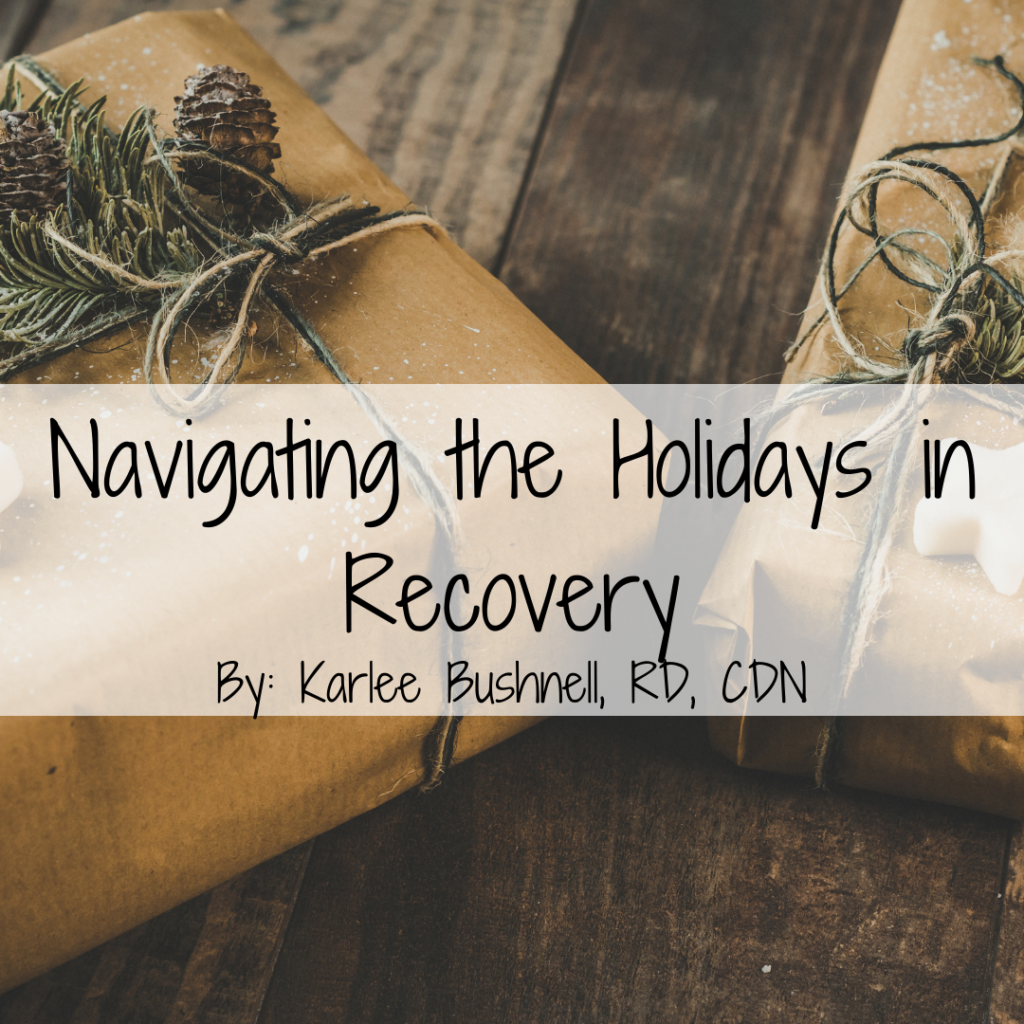If you’re in recovery from an eating disorder (ED), disordered eating or even coming away from chronic dieting, this time of year can present unique and unexpected difficulties. All the way through to the New Year these next few months may seem to have a larger emphasis on food as well as spending more time with others; at the beginning of the New Year, we may also notice an uptick in diet culture messaging and its influences around us. So how can you get through this time of year, trying to enjoy yourself as much as possible while also protecting your recovery? Here are some tips:
Lower Expectations
This may not be something we think of when it comes to celebrating the holidays. There is often a common notion that this time of year has to be the “best time of year”, which just may not be realistic for everyone. If this is the case for you, please hold space and kindness for yourself. The winter holidays may bring up triggering memories of years past, reminders of what was lost throughout struggling with the ED, and just overall more stress, which can be activating to the ED. If you need to just get by these next few months, that’s okay! It may also be helpful to remind yourself what this time of year means to you – family time, relaxation, giving back, gratitude? If you enjoy journaling, think about asking your treatment team for some journal prompts to help reflect on what the holiday season means to you and your recovery.
Set Boundaries
Boundaries are crucial for recovery, especially when we might be spending more time with others. According to therapist Nedra Glover Tawwab, “Boundaries are expectations and needs that help you feel safe and comfortable in your relationships. Expectations in relationships help you stay mentally and emotionally well. Learning when to say no and when to say yes is also an essential part of feeling comfortable when interacting with others” (1). Remember that boundaries can be set externally as well as internally. An external boundary might be to inform loved ones that you are in recovery and discussions around food and weight/body are off limits. An internal boundary may sound like “If my colleagues start to discuss their diets or weight loss at the holiday party, I will try to change the subject or remove myself from the conversation”.
Identity/Lean On Your Support System
This time of year might require more frequent meetings with your treatment team to ensure you feel supported. Make sure to discuss this with them as early on as possible to ensure that appointments can be scheduled at a frequency that feels right for you. Making specific plans in therapeutic and nutrition sessions can help to ease anxiety and make sure you don’t feel like you’re navigating struggles on your own. Identifying support persons outside of the team is important as well. Perhaps a parent, coworker or close friend can be someone that you ask to be an identified support person at a gathering or in general throughout the next few months. Through the National Eating Disorders Association (NEDA), there are also resources such as an online chat function, phone help line, and a text line (2) to provide support and information.
As above, setting boundaries with your support person is helpful for both parties. Be clear about your needs, such as “Is it okay if I text you during the day when my family and I gather for Kwanzaa if I am struggling?” or “Can you plan to sit next to me at the Friendsgiving party to help support me with the meal?”. Allow for your support person to set boundaries with you as well to ensure they feel comfortable helping you. Advocating for your needs is important, as is letting others advocate for theirs too. For example, someone may not be able to be available via text all day during a holiday that they’re also celebrating, but maybe you can agree to checking in every few hours instead.
Follow Your Meal Plan/Honor Your Hunger + Challenging Yourself
It can feel tempting to compensate before holiday meals, but trust me, this helps nothing! If you are on a prescribed meal plan, you can discuss ways with your dietitian to help meet the meal plan alongside any special meals and celebrations. If you are not on a prescribed meal plan, it is still imperative to eat adequately and consistently throughout the day. When we “save up” prior to a meal, we run the risk of low blood sugar levels, as well as arriving at the holiday meal very low on the hunger scale, or ravenous and empty if you aren’t familiar with the scale (3). Entering a meal ravenous or empty increases the likelihood of feeling more urgent and chaotic around food, and eating to a point of uncomfortable fullness.
Gentle reminder though – even if you eat prior to the holiday meal, eating past comfortable satiety at times is completely normal. Fullness is always temporary and you will need to eat again. If you do find yourself feeling discomfort around fullness, you can try some light movement (yoga, stretching or a walk), changing into looser fitting clothes, drinking ginger or peppermint tea, journaling or talking to a support person.
Holiday meals can also be a great practice in saying no – as you are practicing honoring your own hunger and fullness cues and/or following your meal plan, if you do not want something that someone is offering you, politely saying no is completely permissible.
If you’ve agreed with your treatment team to incorporate a food challenge during the holidays, make sure to come up with a detailed plan to support you (who will you be eating the food with, what can you do after if you feel uncomfortable, why is it important to you and your recovery?, etc). Choose challenges that feel meaningful to you! Perhaps you grew up drinking hot chocolate and watching Christmas movies with your cousins, and you’d like to feel more comfortable consuming hot chocolate again. Or maybe your grandmother makes the most amazing latkes during Hanukkah and you have not allowed yourself to eat them in the past few years. Overall, challenges provide an opportunity to strengthen your healthy self, but they can feel even more valuable when they’re significant to you.
Here’s to hoping that you can take what you need from this time of year. As hard as it can be, practice being compassionate to yourself. These next few months can certainly be challenging, but they can also be a wonderful time to build new healthy traditions and reminisce on the progress you’ve made, as well as continue to make in your relationship to food and recovery overall. Happy Holidays!
Sources:
- Tawwab, N. G. (2021). Set boundaries, find peace: A guide to reclaiming yourself. A TarcherPerigee book.
- https://www.nationaleatingdisorders.org/help-support/contact-helpline
- https://www.uttyler.edu/wellness/files/hunger-fullness-scale.pdf



